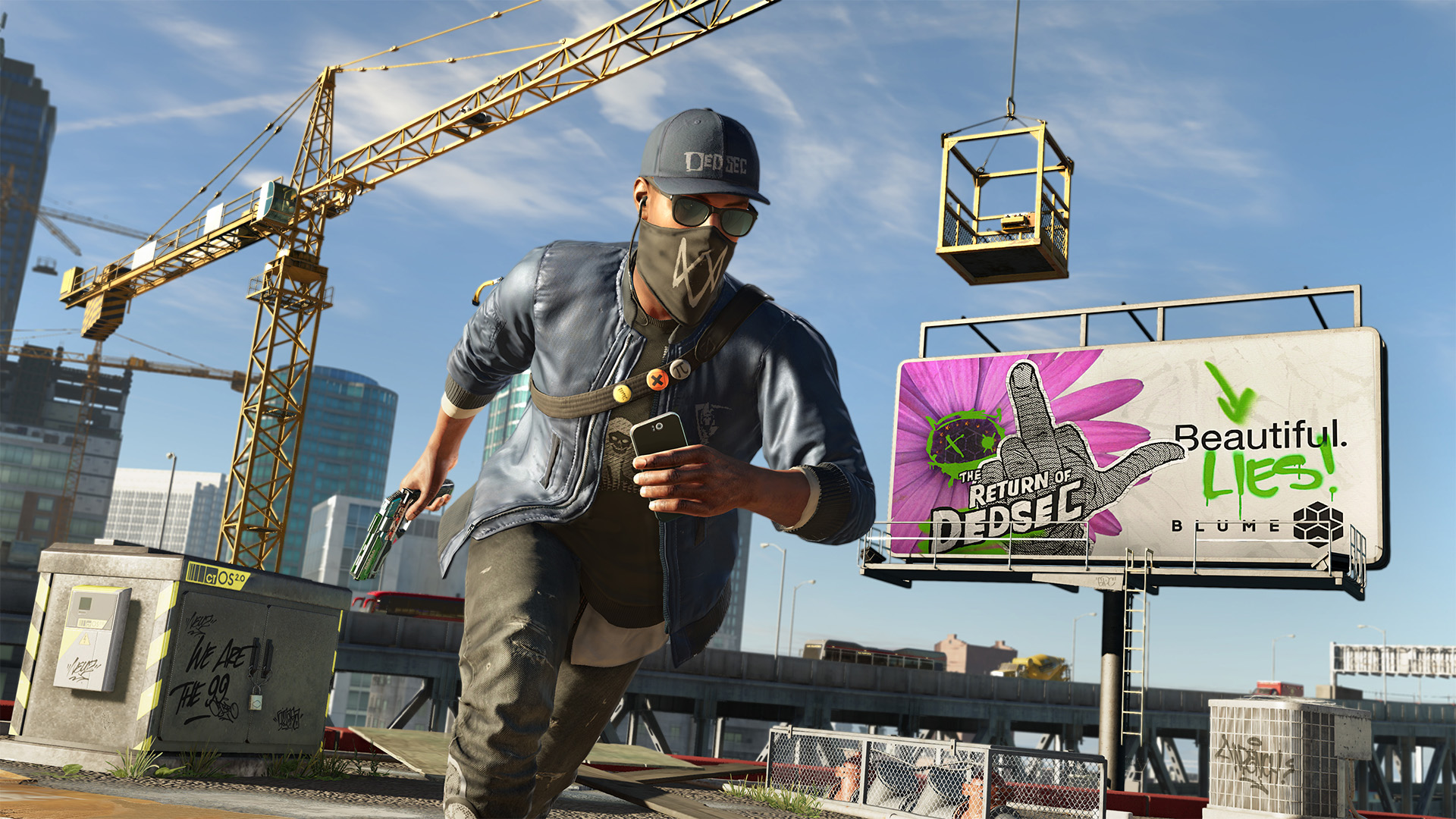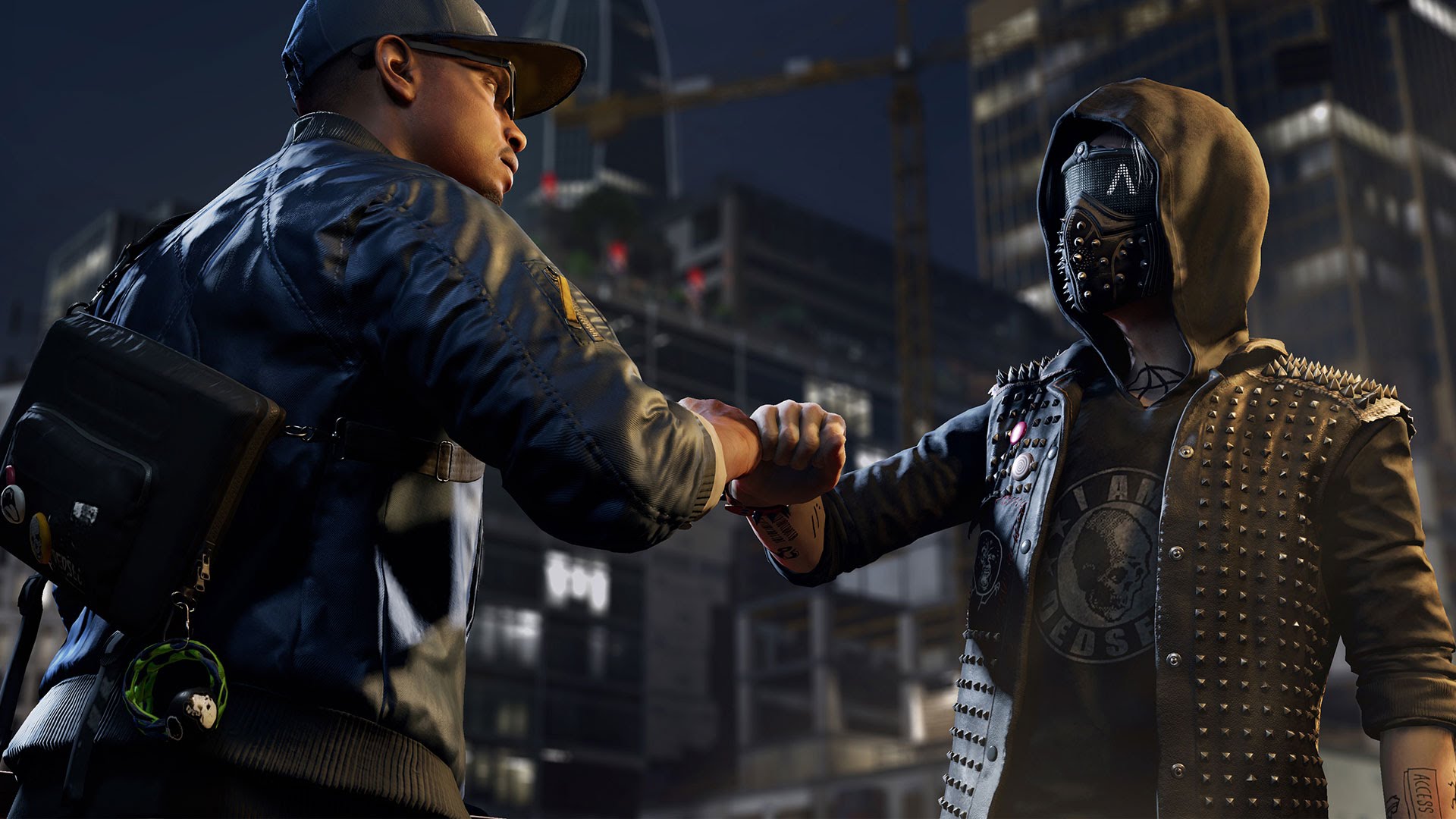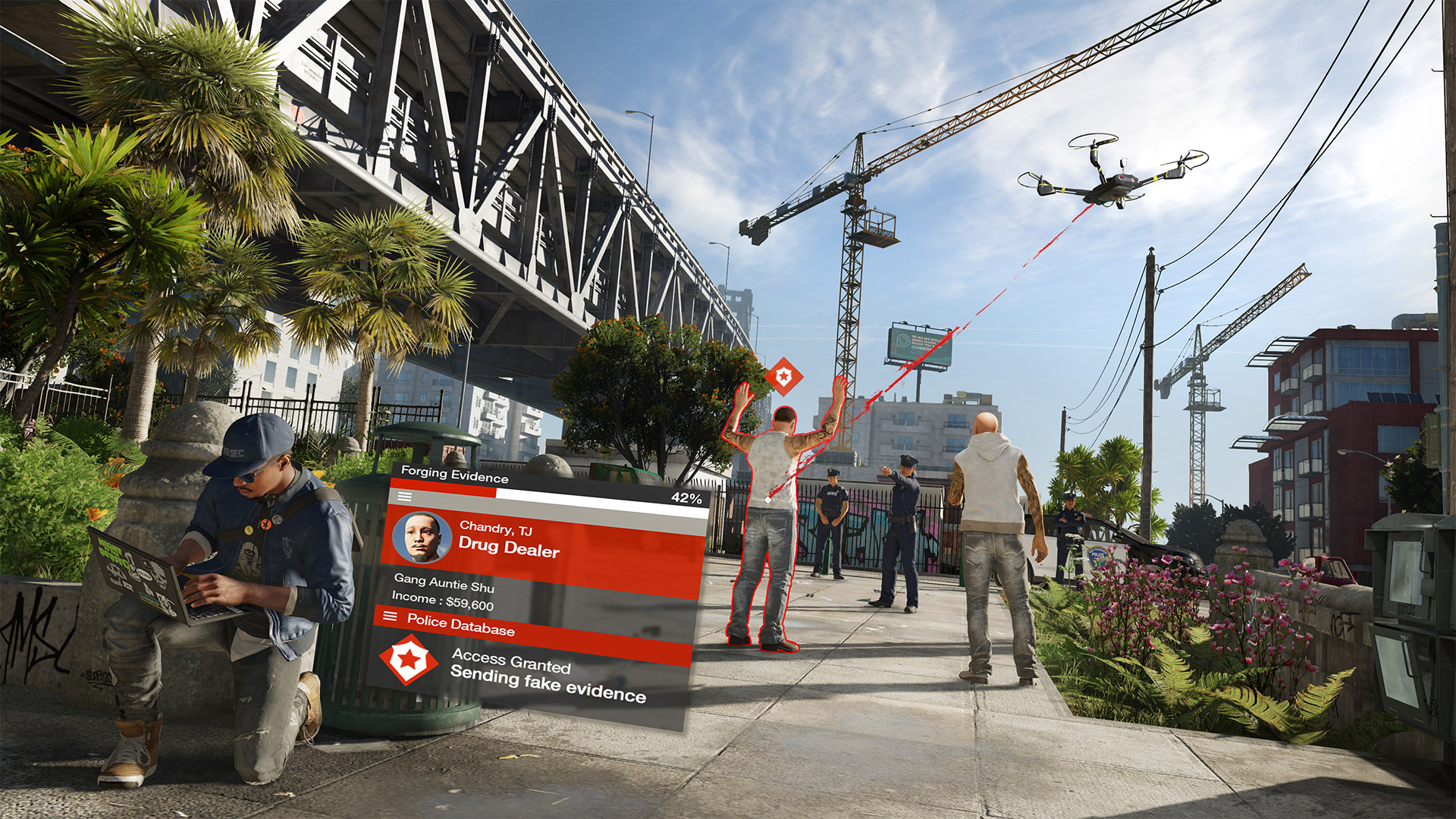Watch Dogs 2 feels slick, enjoyable, but terribly hollow
Hands-on time suggests another stylish hacktivist yarn that refuses to follow through on its premise.

Watch Dogs 2 is about Sticking it to the Man in the same way that ordering salad in a burger joint is about bringing down the entire fast food industry. It's also a joyfully barmy open world affair in which you can get yourself murdered by blowing kisses at gangsters. Watch Dogs 2 is about being an online freedom fighter, waging war on the power-brokers of cyberspace, in the same way that owning a Che Guevara poster makes you a fully paid-up communist. It's also a sleek stealth-action sandbox in which you can dismantle an entire factory complex using nothing but volatile gas pipelines and an RC car.
To play the game is to alternate between giddy enjoyment and a sense of overwhelming superficiality. When I hack the ignition on a yacht through the eyes of my quadrotor drone, smashing the boat against a jetty to the surprise of guards who I then bombard with shock grenades as they move to investigate, I want to buy the designers a drink. But when I hear my character's DedSec chums rant about conformity and consumerism while sipping take-out coffees and brandishing phones full of licensed music, I want to reach through the screen and give everybody a clip round the ear. The game is entertaining under the thumb, but its hacktivist premise rings incredibly hollow.
Thematic inconsistencies of this sort are, admittedly, nothing new for contemporary and vaguely topical blockbusters like Watch Dogs. But there's something especially grating, even second time around, about a tale of battling Big Data that is told through a game with a raft of persistent online features, a game about political and artistic transgression which leverages open world design principles as old and fusty as Assassin's Creed.

Set in San Francisco, Watch Dogs 2 takes this disconnect a little further than its Chicago-based predecessor. Progress through the story of wrongfully incriminated coder Marcus Holloway and the DedSec hacker collective is determined by your in-game social media follower count, Ubisoft's latest analogy for XP, with new missions unlocking once you hit certain milestones. That's right—the real mark of an eRebel is the #clout you have on Twitter.
If Watch Dogs 2's overarching story feels like your G-man dad trying to pass himself off as an underground skater, individual chapters and scenarios may yet intrigue. According to creative director Jonathan Morin, each of the main missions is a study of a particular facet of our present-day digital dystopia. There's a mission where you have to break into a luxurious 'Smart Home', for example, bypassing surveillance systems and chubby robot sentries in search of dirt on Haum Electronics, which is selling personal information to advertisers on the sly.
“It's letting the player kind of connect the dots to an extent, making them reflect about the subject matter, without offering some kind of shallow conclusion in one narrow story,” Morin explained. “We're focusing on the story of DedSec's fight against the Blume corporation, and as you're doing that you're getting a lot of little titbits on the different dimensions of our technology today.”
This doesn't really address the game's basic double standard—any sim in which you can profit from the very infrastructure you're at war with, stealing cash from bystanders using your phone's profiler app, has no real business styling itself as an underdog's story. But there's the opportunity, at least, for some crafty potted social commentary as you gradually bring Blume to its knees. The choice of an African-American lead may also have important repercussions—it's a chance to think about the evolution of racial profiling in the age of algorithms that make snap judgements about users based on your bio. I've seen little so far, however, to indicate that Marcus's race really has a bearing on the world or plot.
The biggest gaming news, reviews and hardware deals
Keep up to date with the most important stories and the best deals, as picked by the PC Gamer team.

Morin adds that being a hacker is less about smashing firewalls or toppling oligarchies as it is revelling in the full capabilities of the systems you're given, for all the efforts of their manufacturers to restrict their usage. It's not about destroying the iPhone, in other words, but realising the device's true potential. Ubisoft Montreal has made this ethic the heart of an open world sandbox in which you can strain the rules to a ridiculous extent, once you've unlocked the requisite abilities.
You might, for instance, rewrite a guard's criminal record in order to get him arrested, then follow up by “outing” one of the other guards as a snitch, drawing the wrath of local gangs and triggering a diversionary gun battle. You can hack every car in the vicinity at once so that they careen into each other, trapping pursuers in gridlock as you flee the area.
“We're literally letting the player break the level design to win, which we thought was the best mechanical way to express what a hacker is,” Morin adds. “A hacker isn't just breaking into computer systems—a hacker is somebody who will look at a problem in an unorthodox way. He's not limited by how the system is designed to work, and in the same way he's not limited by how a society is supposed to function, and this state of mind is there in the game. You can finish a mission without even entering the building. You can go in as a ghost, hopping from one CCTV camera to another.”
Watch Dogs 2's San Francisco is just as fun to meddle with as the restricted areas that house your story objectives. The world's side activities aren't all that novel—think race missions for cars or drones and collectible research points for your skill tree—but the urban simulation is pleasantly lively and responsive, even by comparison with the likes of Grand Theft Auto 5's Los Santos.

While strolling through a suburb, I came across a man using a crowbar to break into a SUV. A swift chop to the back of the neck and the vehicle was mine, leaving the would-be robber to be scooped up by an ambulance. Later I intervened in a lover's street quarrel before it turned violent, persuading the husband to back off using the game's new emote wheel. Emotes are a throwaway but entertaining addition—they affect NPCs at unpredictable distances, and as with the first Fable's sadly forgotten bragging system, reactions will vary wildly. At one point I tried flirting with a bouncer and was jabbed with a taser for my pains.
The game's story scenarios follow a familiar pattern—you drive to a restricted zone, find your way to its core via any combination of force and subtlety, then escape before the hammer comes down. Ubisoft is a dab hand at this kind of setup, and the three infiltration sections I had a go at were nicely varied. In one, I flew a drone around the outside of a tower, disabling circuit breakers in sequence so that I could seize control of the CCTV cameras within. Then I had to loiter in the area waiting for a download to complete while guards searched for the source of the hack.
Watch Dogs 2 seems set to join a long line of major releases that crave the topicality of a fight-the-power tale, but are unwilling to address the implications such a stance may have on their structure and design.
In another mission, I had to retrieve a van-load of goods from behind a security gate, using my RC car and drone to scope out guard patterns, rig traps (you can turn circuit boxes into proximity mines, then lure NPCs toward them) and plot a route. I was rumbled in the attempt, but managed to escape after raising a motorised platform to serve as a sniping point and setting the mafia on one of my assailants.
The energy system that fuels your acts of cyberterrorism is generous—you can refill the bar by picking highlighted options when you hack certain devices—and the third-person controls and context-sensitive animations are as swish as you'd expect from the creators of Ezio Auditore. The car handling feels subtler and more predictable in this iteration, too, thanks to the input of Driver: San Francisco studio Ubisoft Reflections. It's a confident advance on the first game, though more an exercise in rearranging and polishing than a brand new experience.
If only the accompanying story were as consistent and credible. While as slick as any of its Ubisoft Montreal stablemates, Watch Dogs 2 seems set to join a long line of major releases that crave the topicality of a fight-the-power tale, but are unwilling to address the implications such a stance may have on their structure and design. As always you can disregard the writing, treating the game as a mass of variables with some inconvenient cinematic filler, but that's a compromise I'm really beginning to tire of. Ubisoft Montreal excels at crafting beautiful, cohesive environments. Now it needs to be braver with the narratives they contain.

